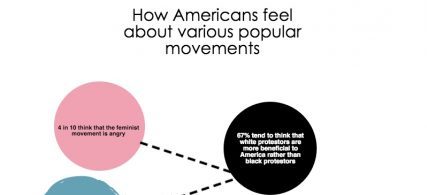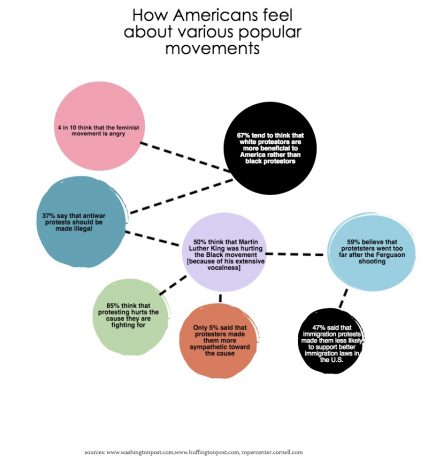
Violent protests break apart American trust
Protesting becomes more prominent than ever
Burning the American flag, intentionally shutting down highways, anti-Trump marches, is it all anti-American or an exercise of rights? Minorities are using their voice in an nontraditional way, and Americans should listen, regardless of their strong political views.
Movements such as Black Lives Matter, Free The Nipple, the feminist movement and even the environmentalist movement can all be considered violent, mostly by the Republican party. Those with contrasting views of socially progressive movements often do not believe in protesting at all, and often think that all protests eventually evolve into a hate speech. We can assume that this is a generalization of recent news and they are not all that wrong. Violent freedom of speech is in fact illegal, as stated in the Constitution.
The Public Religion Research Institute found that 67 percent of Americans believe that protesting against the government is beneficial to the nation, but this number dropped to 48 percent when asked about the Black Lives Matter movement. This may or may not stem from the stereotype that black people are generally angry and aggressive, or that this past year, the movement has been one of the most controversial topics.
In September on ABC News, President Obama commented on violent protests after the murder of an unarmed black man. He said, “The way we change the system requires us to be able to reach out and engage the broader American community. And that requires being peaceful. The overwhelming majority of people who have been concerned about police community relations doing it the right way. Every once in awhile, you see folks doing it the wrong way.”
Days on end after Donald Trump became president-elect, there were violent protests all across America. Nineteen cars were smashed at a protest in Portland, Oregon, along with several windows of businesses, as well as burned an American flag and forced trains to delay. Along with this, there were #NotMyPresident protests across the country, including various cities such as Los Angeles, Atlanta, New York City, etc. All of these protests turned violent.

In Los Angeles, protesters burned a Trump paper maché, started fires on intersections in Oakland, beat a Trump piñata, as well as spray painted L.A. walls and news vans with anti-Trump messages. In Atlanta, protesters blocked and shut down roads. In New York, things got out of hand with over 1,000 people rioting outside of the Trump Tower, which caused police to install barricades to calm the heated situation down.
Additionally, there was a protest in the familiar city of St. Paul; specifically at the Capitol. This protest led into downtown St. Paul, and eventually into Minneapolis, and ended up blocking roads. The protesters made their way to University Avenue where they shouted powerful words regarding Trump’s win.
To some, even if you don’t support Trump, these actions and words came across as inherently unfriendly. In fact, Trump and Clinton supporters may even finally share a belief when it comes to violent protesting.
Junior Kimma Erenberg said, “Violent protests are no better than what they are protesting against,” […] “Violent protesting can be harmful to innocent bystanders. And police, who are only trying to diffuse the violence.”
Celebrities using their platform to speak out
On the opposite end of the political spectrum, rapper T.I explained on Jimmy Kimmel Live! why he protested after Trump won presidency. He said, “Nobody in their right mind can just assume that gathering, going somewhere and showing your incredible disdain for a decision that the nation has made, that that would actually do anything immediately.”
The rapper recently released an album called US Or Else that was an unintentionally a political statement. The album artwork included the letters “U” and “S,” bubbled in with an American flag; the two letters are a homonym, meant to signify the United States. “It could be considered a protest album. It’s protesting against police brutality, and, you know, it’s really in memory of all the young men and women who have lost their lives and the hand of law enforcement unnecessarily out there in the communities with no accountability whatsoever. I just really want to see the nation head into a better direction.
Unfortunately, many anti-protesting individuals may view all protests as violent even if they are qualified as not as such. But, fortunately the Wikipedia definition of nonviolent resistance reads, “Nonviolent resistance (NVR or nonviolent action) is the practice of achieving goals such as social change through symbolic protests, civil disobedience, economic or political noncooperation, satyagraha, or other methods, without using violence. This type of action highlights the desires of an individual or group that feels that something needs to change to improve the current condition of the resisting person or group.”
This means that as long as protests are not physically aggressive, obscene or disruptive, the protest is considered peaceful.
Whether violent protests, or even just protests in general are anti-American is debatable, but the argument that is presented as against seems to lack basic understanding of the Constitution and freedom of speech. The First Amendment reads, “Congress shall make no law respecting an establishment of religion, or prohibiting the free exercise thereof; or abridging the freedom of speech, or of the press; or the right of the people peaceably to assemble, and to petition the Government for a redress of grievances.”
Adding on to this, [some] rightists claim that violent protesting is a form of hate speech. But, whether you are for violent protesting or against, the actual definition of hate speeches do not include violent protesting, for most violent protests are a way to convey a political message rather than the definition of a hate speech, which is: “Hate speech is speech that attacks a person or group on the basis of attributes such as gender, ethnic origin, religion, race, disability, or sexual orientation.” Therefore, what rightists consider a “violent protest” is actually against everything that hate speeches are.
Both sides to this argument are politically logical. While violent protesting may not solve much and may actually worsen the cause, it can also be used as a way to express powerful political statements/conceptual art that would not be heard had it not been [considered] violent.
Erenberg adds to her original statement, “Some [violent protests] may be rooted with good intentions, but people should know when to stop.”
Maddy • Feb 10, 2017 at 11:06 am
The infographic that goes with the story was well done and easy to read. The story gave good quotes about why violent protests aren’t appropriate and “aren’t better than whatever they are protesting against.”
Cates Eliasen • Feb 10, 2017 at 10:25 am
Beautifully written article! I really loved how passionate and in depth you went with every topic. Some writers struggle with addressing multiple topics, but it seems that you did so with ease, organization, and articulation. Interesting read and unique take on it!
Quinn Kuslich • Feb 9, 2017 at 4:21 pm
I liked how detailed this article was showing both sides of the argument, which is important in this department. Great article.
Tiana Meador • Feb 9, 2017 at 11:47 am
This was an interesting angle to take. Normally when we consider an editorial, we think of polar views, but I like that throughout this article you spoke on how violent protesting is both an exercise of minority voices and a potential threat to society and/or constitutionally illegal. Very well written with strong facts to support.
Jared Taylor • Feb 9, 2017 at 8:16 am
This editorial was great. The facts show the in-depth research that was put into this article. The quote from Former President Obama gave the story a more wide perspective of this issue and how it effects everyone. The overall attention to the issue pushes this article from a good story to a great story.
Max Korth • Feb 7, 2017 at 7:02 pm
This article was very good, it gave lots of in-depth information on topics like protests and the differing opinions on each side of the political spectrum. Also this article kind of cleared up some of the uncertainty revolving around these protests and how they are being perceived by the public. Also this article kept me intrigued throughout the entire story.
Cates Eliasen • Jan 20, 2017 at 9:52 am
Really great article! It is easy to see that you did a lot of research and went into great depth with every topic you discussed. I especially enjoyed how you went into great depth on topics like Black Lives Matter, the first amendment, and other more controversial topics that are often brought up in relation to protesting. Your way of addressing stereotypes was also very classy and well done.